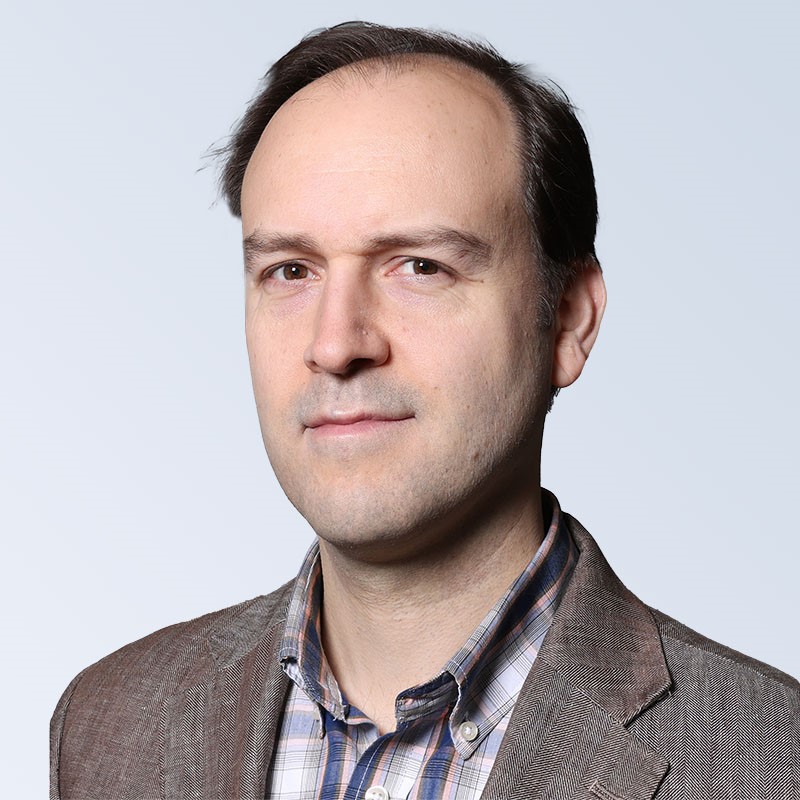
Advancing Lab Science with Artificial Intelligence


Anna joined SDSC as a Data Scientist focusing on industry collaborations in July 2019. She completed her PhD in Bioinformatics at the University of Luxembourg, where she analysed large-scale heterogeneous datasets and leveraged multiple disciplines: Statistics, Network Analysis, and Machine Learning. Before joining SDSC, Anna worked as a Data Scientist at Deloitte Luxembourg, with a focus on computer vision and time-series analysis.Currently, Anna is a Principal Data Scientist based at the ETH Zurich office, where she leads biomedical collaborations with industry partners. Anna works on a range of projects: protein properties prediction, biomanufacturing optimization, statistical model evaluation and others.

Presentation
Bridging Academia and Industry
We are excited to invite Toolpoint members and new organizations to the inspirational end-of-year event co-organized with the Swiss Data Science Center (SDSC) and CSEM.
Artificial Intelligence is on everybody’s mind, but how can we harness it for our Lab Science businesses? Toolpoint has teamed up with the SDSC and CSEM to organize this after-work event and an AI focus group for Toolpoint members, which will start in 2025.
Discover how the Swiss Data Science Center can assist you in your AI journey:
The Swiss Data Science Center (SDSC) is a strategic focus area of the ETH domain, with EPFL and ETH Zurich as founding partners, developing into a National Research Infrastructure in 2025. Its mission is to support academic labs, hospitals, industry and public sector stakeholders, including cantonal and federal administrations, through their entire data science journey, from the collection and management of data to machine learning, AI, and industrialization.
Details
Date & Time
November 28th, 2024, 16:30 – 20:00
Venue
ETH Zurich "Swiss AI Tower" - Andreasstrasse 5, 8092 Zurich-Oerlikon, Switzerland
Target Audience
CEOs, CTOs, CSOs, R&D Heads and Project Leaders
Cost
Free of charge for Toolpoint members.
CHF 45 per person for external organizations.
Registration
Register today via email to office@toolpoint.ch
More Information
Please contact Christian Walter, Managing Director at Toolpoint
Programme
16:30 Meet and greet, arrival and coffee
16:50 Opening words by Christian Walter, Toolpoint
17:00 Keynote “Developing the foundations for applying AI to cell & gene manufacturing”
by Antoine Maison, Tigen Pharma
17:40 “Measuring the Real Impact of AI-Driven Innovation” by Dr. Anna Fournier, Swiss Data Science Center
18:00 “AI for Lab Sciences: How Ideas Turn into Products” by Dr. David Hemmi, CSEM
18:20 Closing remarks and end-of-year review by Christian Walter, Toolpoint
18:30 Networking apéro
20:00 End of event
Other events

ENID | Enabling Innovation with Data Science at ETH Zurich


Dr. Olivier Verscheure is the director and founder of the Swiss Data Science Center (SDSC). Olivier also co-leads a joint training program between EPFL and HEC Lausanne, specifically designed for senior executives. Since 2018, Olivier has been a member of the Board of Directors of Lonza, a global leader in the life sciences sector. This company provides products and services to the pharmaceutical, biotechnology, and specialized healthcare industries.Olivier began his career at IBM Research after earning his Ph.D. in computer science from EPFL. He held several research and leadership positions at the IBM T. J. Watson Research Center in New York and co-created and co-directed the IBM Research center in Dublin, Ireland, before joining the EPFL in 2016.


Silvia holds an MSc in Computer Science from EPFL and a PhD in Computer Science from the University of York, UK. She has been a senior research fellow at the University of Trento and later at Politecnico di Milano, Italy. Here, she had the chance to work on Marie Curie and ERC projects relating to natural language processing. From 2012 to 2019, she was a Senior Manager and NLP expert at ELCA Informatique Switzerland, whose AI department she helped create and expand. Silvia joined the Swiss Data Science Center in 2019 and is currently its Chief Transformation Officer, in charge of the team leading organizations to digital transformation.


Anna joined SDSC as a Data Scientist focusing on industry collaborations in July 2019. She completed her PhD in Bioinformatics at the University of Luxembourg, where she analysed large-scale heterogeneous datasets and leveraged multiple disciplines: Statistics, Network Analysis, and Machine Learning. Before joining SDSC, Anna worked as a Data Scientist at Deloitte Luxembourg, with a focus on computer vision and time-series analysis.Currently, Anna is a Principal Data Scientist based at the ETH Zurich office, where she leads biomedical collaborations with industry partners. Anna works on a range of projects: protein properties prediction, biomanufacturing optimization, statistical model evaluation and others.


Matthias Galipaud obtained his PhD in evolutionary biology in 2012 from the University of Burgundy in Dijon (France), and held postdoctoral positions as a mathematical biologist at the university of Bielefeld (Germany) and the university of Zurich, where he researched the evolutionary theories of aging and mate choice. In 2020, he became a data scientist, developing machine learning solutions for startups in Switzerland and Australia before joining the SDSC Innovation Team in November 2022.


Dan received an MSc in civil and environmental engineering from UC Berkeley and a Ph.D. from EPFL, where he developed models combining machine learning and geographic information systems to estimate renewable energy potentials on a large scale. After serving as a researcher/data scientist at Unisanté (Lausanne) and completing a one-year postdoc at the Quebec Artificial Intelligence Institute (Mila) in Montréal, Dan joined the SDSC Innovation team. His work has generally been focusing on crafting and tailoring machine learning methods and deep learning architectures for a variety of domains, most notably the spatio-temporal modeling and forecasting of environmental and energy related variables, as well as multiple applications in public health research.

Synthetic Data for Biomedical Applications


Before joining SDSC, Arshjot Khehra received his MSc in Artificial Intelligence from USI Lugano, where he completed his thesis on hierarchical graph reinforcement learning. Previously, he worked for 4+ years across India and Singapore gaining data science experience in insurance, logistics, and manufacturing sectors. He also holds a BSc in Industrial Engineering from PEC Chandigarh. Over the course of his career, Arshjot worked on a wide array of projects, such as, handwritten text recognition and generation, voice matching across phone call recordings, policy lapse rate prediction for customer retention, and automated insurance claim processing.


Matthias Galipaud obtained his PhD in evolutionary biology in 2012 from the University of Burgundy in Dijon (France), and held postdoctoral positions as a mathematical biologist at the university of Bielefeld (Germany) and the university of Zurich, where he researched the evolutionary theories of aging and mate choice. In 2020, he became a data scientist, developing machine learning solutions for startups in Switzerland and Australia before joining the SDSC Innovation Team in November 2022.


Valerio started his career working for 7 years as a particle-physics researcher at CERN. There, he used state-of-the-art techniques to extract information from data, especially to search for traces of dark matter in particle collisions. Since 2016, he has worked in consulting, applying data science in several industries. First, he joined the Quant team of Ernst & Young in Geneva. Later, he created his own company, SamurAI sàrl, providing consulting services for his clients. He also has a passion for teaching very complex subjects in simple terms. That is why he particularly enjoys offering training programs to private companies and universities. Valerio joined the SDSC in Mai 2022 as a Principal Data Scientist with the mission of accompanying industrial partners and other institutions through their data science journey.

Data Science for the Sciences


Guillaume Obozinski graduated with a PhD in Statistics from UC Berkeley in 2009. He did his postdoc and held until 2012 a researcher position in the Willow and Sierra teams at INRIA and Ecole Normale Supérieure in Paris. He was then Research Faculty at Ecole des Ponts ParisTech until 2018. Guillaume has broad interests in statistics and machine learning and worked over time on sparse modeling, optimization for large scale learning, graphical models, relational learning and semantic embeddings, with applications in various domains from computational biology to computer vision.
Contact us
Let’s talk Data Science
Do you need our services or expertise?
Contact us for your next Data Science project!



